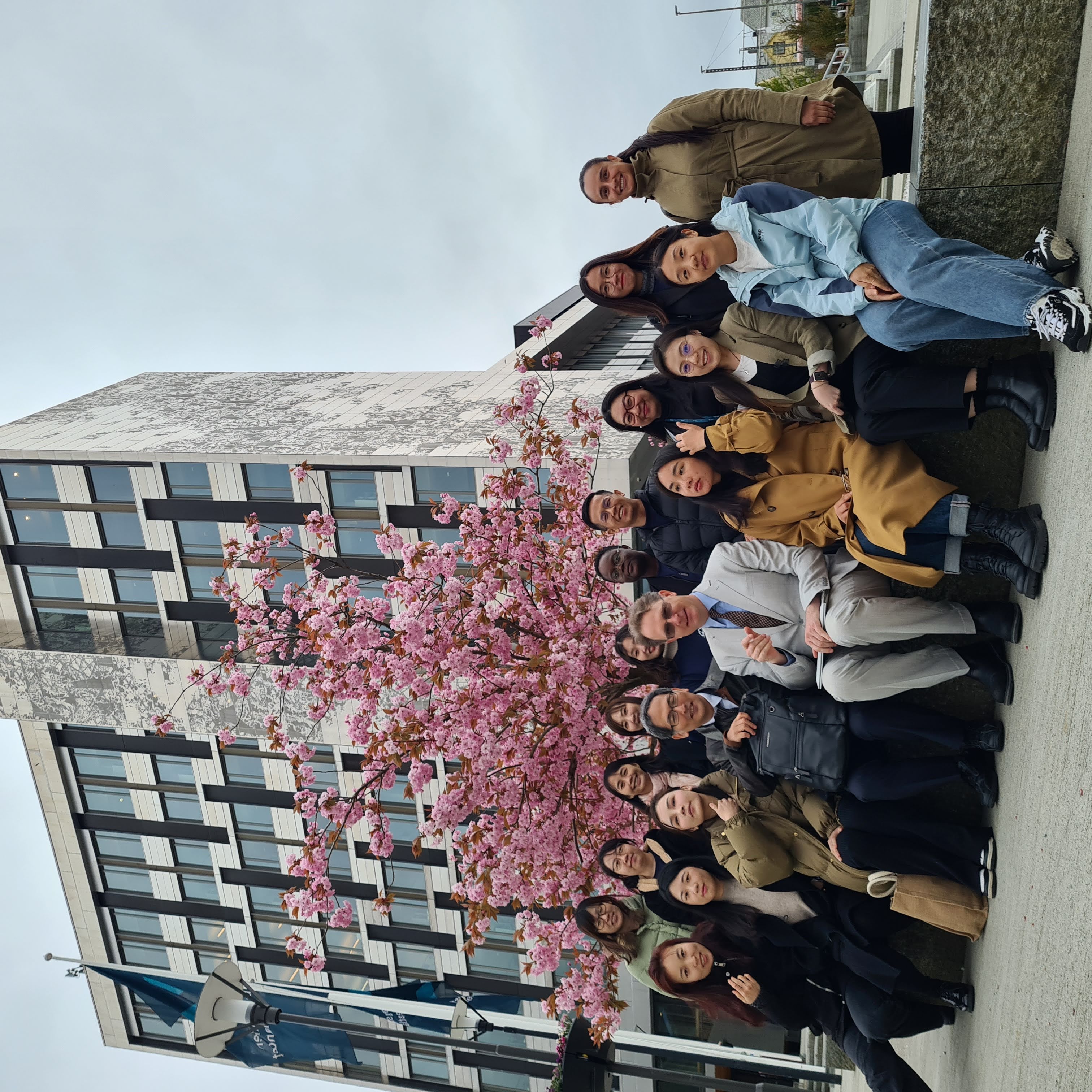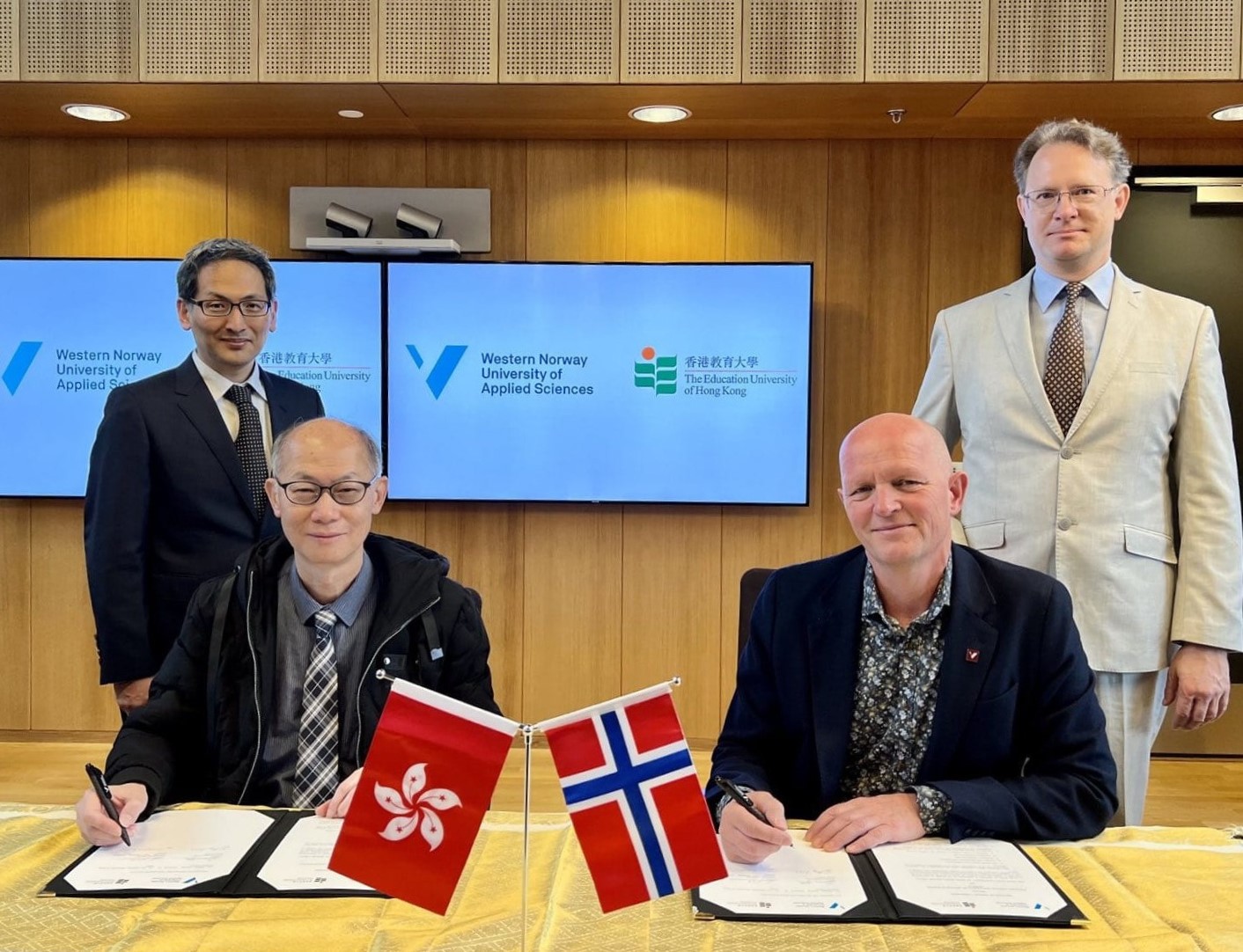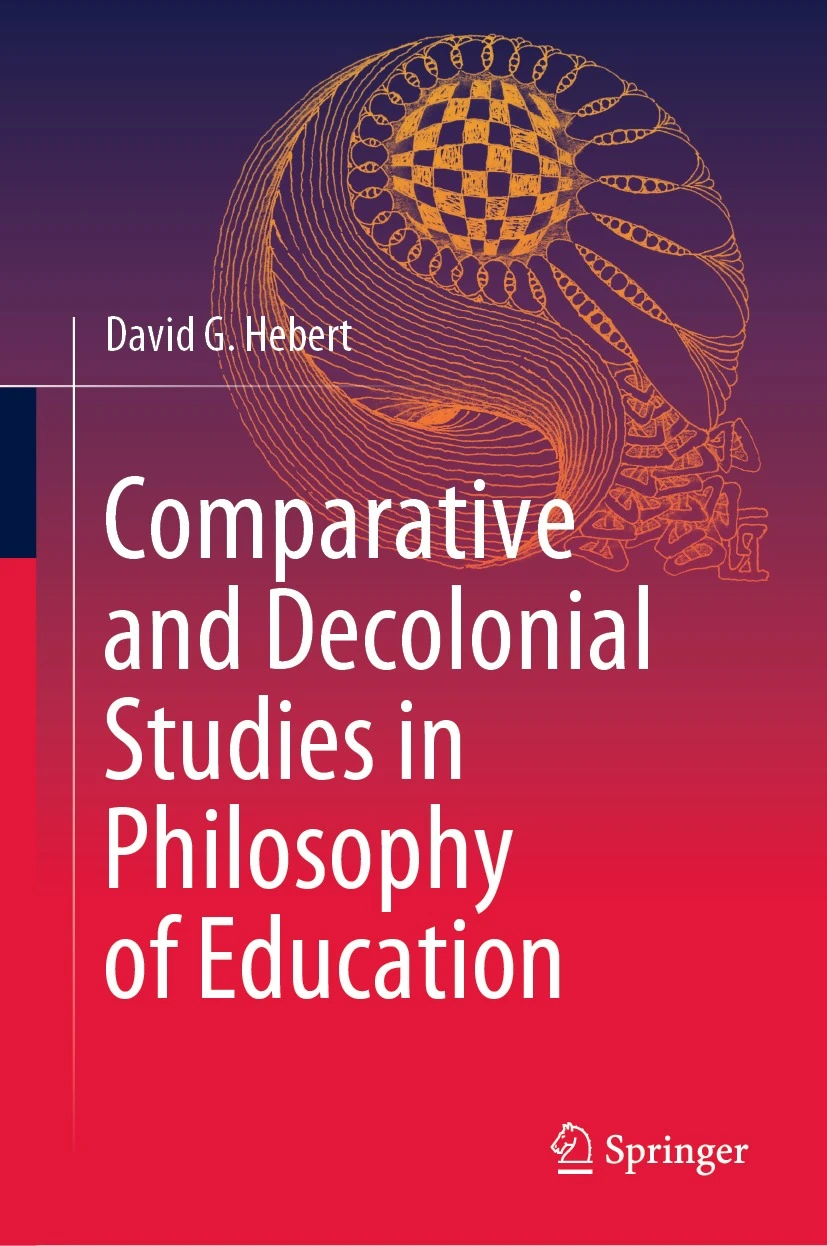
Global Competence Partnership
This partnership is designed to strengthen cooperation and quality of doctoral and postgraduate education between Western Norway University of Applied Sciences (HVL) and Education University of Hong Kong (EdUHK).
The next generation of college and university professors will need not only theoretical knowledge but also a high level of practical skills informed by intercultural experience. Among the Global Competence Partnership innovations are two COIL (Collaborative Online International Learning) courses and two new joint courses from each partner with an emphasis on 'Global Competence' and research-based practice, and leading to design of an option for a shared doctoral degree in Education. Through intensive Research & Writing Workshops, and application of innovative pedagogies, the project will upgrade teaching while boosting research outcomes.
The Global Competence Partnership is funded by the UTFORSK programme through its grant Global Competence and Research-Based Practice in a Doctoral and Postgraduate Partnership (Project number UTF-2021/10057), 2023-2026. Two institutions—located in Northern Europe and East Asia, each with extensive international networks—collaborate in the Global Competence Partnership: Western Norway University of Applied Sciences and Education University of Hong Kong.
Project Announcements:
Summer Research School in Hong Kong

A delegation of PhD students from Western Norway University of Applied Sciences is now preparing to visit the Education University of Hong Kong in July 2024 to participate in its annual International Postgraduate Roundtable and Research Forum cum Summer School (IPRRFSS). The theme of the event for this year is Innovations and Sustainability: Shaping Education and Global Futures.
Spring Planning Visit to Hong Kong

Global Competence Partnership (GCP) project manager David Hebert visited Hong Kong for 2.5 weeks in March 2024 for further development of the Norway-Hong Kong collaboration. While at EdUHK, Hebert frequently met with Koji Matsunobu, who now leads the university’s Department of Cultural and Creative Arts. He also enjoyed opportunities to meet for discussions with the university’s Vice President Sing Kai Lo, Graduate School Dean Michelle Gu, and Vice President Chetwyn Chan.
Hebert participated in a postdoctoral research group meeting (with Lexuan Zhang, Luna Ning Luo and Robbie Ming Hon Ho), the arts education doctoral seminar (coordinated by Lexuan Zhang), as well as a doctoral qualifying examination for Kay Li Wing Ki. He also met with ISME President Bo-wah Leung and other colleagues, such as composer and music technologist Michael Chi Hin Leung and music education researchers Yang Yang and Matthew Thibeault.
During his time in Hong Kong, a delegation with students from Nara University of Education (Japan) came to visit EdUHK for a joint symposium and concert, and through that event Hebert met with Japan-based Chinese ethnomusicologist Prof. Lin-Yu Liou and pianist Suzuki Keishi. Hebert also met with prolific music education historian Prof. Wai-Chung Ho (Hong Kong Baptist University), who has produced several interesting books across the past decade. 
Other highlights of this visit were the thirtieth anniversary homecoming event for the EdUHK campus and a session of outdoor music making (pictured here), as part of “JC Project MuSE: Music for All”, a major externally-funded arts project for under-privileged children affiliated with EdUHK and other Hong Kong institutions.
This visit enabled further planning of activities for the Global Competence Partnership project in 2024, including co-authoring and co-supervision as well as future visits of faculty and postgraduate students from Norway to Hong Kong.
Executive Delegation from Hong Kong Visits Bergen

On 25-26 January 2024, a delegation of senior executive leaders and professors from the Education University of Hong Kong visited HVL-Bergen to discuss ongoing cooperation and additional forms of potential collaboration in education and research. The delegation from Hong Kong included the university’s vice president for research and development, the dean of the graduate school, and other senior executive leaders.
Beijing Symposium on Talent Development

On January 5, 2024, two GCP project members, professors David Hebert (HVL) and Bo-wah Leung (EdUHK) participated as Invited Experts at the symposium Global Perspectives Toward Talent Development in Music Education held at Beijing Normal University and broadcast on CCTV. The discussion emphasized ways of responding to demographic shifts, policy changes and the rapid development of AI. Click here to read more!
Intensive Course for Hong Kong Postgraduates
 Master and Doctoral Students from EduHK together with the project leaders from each instituion, David Hebert (HVL) and Koji Matsunobu (EduHK).
Master and Doctoral Students from EduHK together with the project leaders from each instituion, David Hebert (HVL) and Koji Matsunobu (EduHK).
It has been exciting to host a group of 19 Doctoral and Master students from Hong Kong in Bergen across a 2-week period in December 2023 for a new intensive course called Education and Society in Norway Today. It is the second time in 2023 that we have had a large delegation of visitors coming from Hong Kong to Bergen through this project, which enables collaboration at the PhD and faculty development levels.
This time, the 19 students came to Bergen along with one professor (Koji Matsunobu) and one administrator (Rachel Yik Man Li). Their intensive course has featured academic lectures and discussions, museum tours, visits to an array of Norwegian schools (including comprehensive school, outdoor school, barnehage, and kulturskole, and the HVL Stord island campus), cultural heritage sites (Viking sites, stave churches, etc.), and training in VR/MR technologies and educational research methods.
Click HERE to see an article about our Outdoor School visit as part of the recent course in the local Nordhordland newspaper.
This weekend we also hosted the second annual GAME Symposium of the Grieg Academy Music Education research group, which featured writing workshops for an EU Horizon Europe application as well as cooperation with notable Sami musicians. The GAME symposium in Bergen included a number of scholars, musicians and other guests doing interesting work: Stefan Ostersjo, Johan Sara, Annukka Hirvasvuopio, Maia Mazurkiewicz, Mikolaj Rykowski, Judith Trondle, Boris Traue, Knut Eysturstein, Susanne Rosenberg, Koji Matsunobu, David Johnson, Odd Turleiv Furness, Sondre Pettersen, Steinar Satre, Sergei Tchirkov, Jostein Stalheim, Knut Jonas Sellevold, Matthieu Stepec, and several more joining online.
Click HERE to learn about the 2022 GAME Symposium offered last year.
First Bergen Delegation to Hong Kong



During the second week of August 2023, a delegation from HVL-Bergen visited Hong Kong for project planning and lectures. There they met with the Professor Chetwyn Chan, Vice President (Research and Development), and Professor Michelle Gu, Dean of the Graduate School, among others. HVL Professor Tom Are Trippestad lectured on the rhetoric of crisis in educational policy, and Professor David Hebert lectured on AI in higher education. The delegation was invited to the Hong Kong Jockey Club, a major philanthropic organization, and attended a vocal jazz concert of EdUHK students.
During the final days of that week, David Hebert travelled with several EdUHK professors and doctoral students to the Asia-Pacific Symposium for Music Education Research (APSMER) in Seoul, Korea, where they gave presentations along with 500 participants from several countries. EdUHK Professor Boh-wah Leung, a participant in the Global Competence Project, is currently the President of APSMER as well as President of the International Society for Music Education.
First Hong Kong Delegation to Bergen
On 15 May 2023 a delegation of 20 university leaders, professors and doctoral students travelled from Hong Kong to Bergen for an academic symposium and to sign a Memorandum of Understanding (MOU) for cooperation between our institutions. You can find the detailed program here.


Left: Doctoral Students from EduHK together with the project leaders. Right: Sing Kai Lo, EdUHK Assoc-VP and Rector Gunnar Yttri signing the MoU.
Partnership Outcomes

A book has already been developed that is partly an outcome of collaboration between our institutions, Comparative and Decolonial Studies in Philosophy of Education. The book includes multiple contributors from Western Norway University of Applied Sciences and Education University of Hong Kong. A very positive review of this book is now published in the journal Educational Philosophy and Theory.
The GCP-project coordinators have also co-authored a book chapter: Hebert, D. G. & Matsunobu, K. (2023). Learning of Musical Instruments in Japanese Schools. In H. Johnson (Ed.), Handbook of Japanese Music in the Modern Era. Amsterdam: Brill.
New Doctoral and Postgraduate Courses
The Global Competence Partnership will actively develop several innovative courses in an intensive COIL (collaborative online international learning) format to strengthen doctoral studies and faculty professional development at the partner institutions.
Likely course titles include the following:
- Foundations and Practices of University Pedagogy
- Assessment and Evaluation: Feedback Literacy
- Methods for Effective Online Higher Education
- Research Supervision (PhDs/postdocs and research groups)
- Diversity, Equity and Inclusivity in Higher Education
- Research Methods in Higher Education
- Innovation and Entrepreneurship
- R&D Project Management in Higher Education
- Research Dissemination: Effective Publications and Presentations
- Ecologically Responsible Arts Education
- Global Philosophies of Education
Global Competence Concept
The Global Competence Partnership is founded on the principle of “global competence” as a defining feature of quality and relevance in contemporary education, including higher education. Here is how the OECD defines key elements of global competence:
- The capacity to evaluate information, formulate arguments, and explain complex situations and problems by using and connecting evidence, identifying biases and gaps in information and managing conflicting arguments.
- The capacity to identify and analyse multiple perspectives and world views, positioning and connecting their own and others’ perspectives on the world.
- The capacity to understand differences in communication, recognising the importance of socially-appropriate communication conventions, and adapting communication to the demands of diverse cultural contexts.
- The capacity to evaluate actions and consequences by identifying and comparing different courses of action and weighing these actions against one another on the basis of short- and long-term consequences.
To summarize, “Globally-competent individuals can examine local, global and intercultural issues, understand and appreciate different perspectives and worldviews, interact successfully and respectfully with others, and take responsible action toward sustainability and collective well-being” (OECD, 2018, p. 4).
